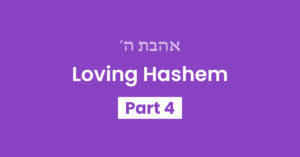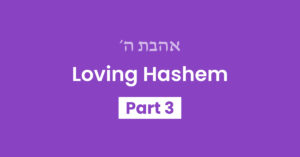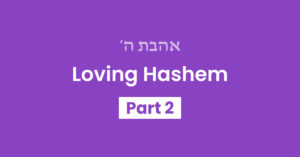Every day, we read a famous passuk in Shema: “V’Ohavta Es Hashem Elokecha – And you should love Hashem, your G-d.”1
But what if I just don’t feel like I love Hashem right now? Is it something I can control?
Loving Hashem isn’t just “a nice thing to do” – it’s actually something that we are each required to feel on a constant basis. In fact, it is one of the “Six Constant Mitzvos” that each of us must fulfill at all times.
How can we be commanded to love Hashem, if the feeling of love is out of our control?
How can we be commanded to love Hashem, if the feeling of love is out of our control?
The Most Basic Level of Love
On the most basic level, one way to begin to love someone is if you notice how much they have given you. Consider the following cases:
On the most basic level, one way to begin to love someone is if you notice how much they have given you.
CASE A: You are drowning in an ocean and a lifeguard jumps in to save you. When you are finally back on dry land and breathing normally again, all you can say to the lifeguard is, “Thank you! Thank you! I cannot thank you enough! You saved my life! Thank you!!!!”
CASE B: You are eating breakfast and your father comes home and says: “I went to a bris this morning and they had chocolate truffles. I know how much you like chocolate truffles, so I saved one for you and brought it home. Enjoy!” You smile at your father and give him a hug and say, “Thank you! I love you!”
What is the difference between these two cases? Why, in the first case, do you feel overwhelming gratitude toward the lifeguard… but in the second case, your gratitude toward your father is additionally mixed with love?
One answer may be that there is a difference in the type of relationship you have – and plan to have in the future – with the lifeguard and your father. The lifeguard is just a temporary figure in your life. Yes, you might send him a thank-you card each year on your birthday to thank him for enabling you to continue to live, but that is basically the extent of your relationship with him.
Your father, on the other hand, is a continuous, ever-present figure in your life. You interact with him daily and talk to him frequently. Furthermore, you know that he cares about you deeply. The lifeguard may have just saved your life because that’s his job that he is paid to do, but your father cares about you deeply and has you constantly on his mind. Therefore, when your father gave you the chocolate truffle, it was a gift that was a direct expression of his love for you. When you receive his gift, that love is reflected by you, too. You feel not only appreciation, but also an increase in love toward him.
Applying It to Hashem
The same is true with Hashem. Hashem gives us a constant stream of gifts on a daily, even moment-to-moment basis. He gives us the gift of life, allows us to breath, move, and talk. Every breath we take, every movement we make, is only because Hashem gives us the energy and ability to do so. He gave you that delicious fresh pineapple you ate the other day, and gave you beautiful sunsets to look at. Even before you were born, Hashem directed your body’s cells to create tiny fingers and toes and made your heart pump and brain neurons fire for the first time.
Hashem gives us a constant stream of gifts on a daily, even moment-to-moment basis.
Why does Hashem do all this? Because He loves us! The Navi tells us: “Ahavti Es’chem Amar Hashem – ‘I love you,’ says Hashem.“2 “Banim Atem LaHashem Elokeichem – You are children of Hashem.”3 “Va’eirasteech Li L’Olam – and I betroth you [the Jewish People] to Me [Hashem] forever.”4 Hashem loves us, and that’s why He gives us so many beautiful and enjoyable things in this world.
If Hashem was just giving us all these things because He wanted to enable us to serve Him and do mitzvos, He could have made a very boring, dull, bland world. He could have created grey, tasteless foods which would still give us energy, and grey, boring skies. But instead, Hashem made a beautiful world that we can enjoy, and created us with the five senses to enable us to enjoy this world, because He loves us.
Every time we recognize one of these gifts, it helps us love Hashem more and more. Hashem is not like the lifeguard who helps us once and then walks away. Rather, He is our loving Father who gives us constant gifts out of love, as part of a lasting, ongoing relationship with Him.
Every time we recognize one of these gifts, it helps us love Hashem more and more.
When we realize that Hashem is trying to develop an ongoing, everlasting, close relationship with us, then every gift is seen in this broader context, and every single gift – whether large or small – engenders more and more love between us.
This is perhaps part of what the Maharal5 means when he says that “love is connection” and what the Kli Yakar6 means when he writes that the more you love someone, the more you want to draw closer to them. When you are in a loving relationship and one person gives to the other, each act of giving engenders not only gratitude but a deeper level of love, connection, and closeness between the two of you.
This week, let’s practice noticing some of the wonderful gifts Hashem has gives us, and thinking about how these gifts are an expression of Hashem’s love for us. The more we recognize Hashem’s infinite loving gifts, the more we will feel love back toward Him and fulfill the mitzvah of Ahavas Hashem.
Sources: [1] Devarim 6:5; [2] Malachi 1:2; [3] Devarim 14:1; [4] Hoshea 2:21; [5] Maharal Chiddushei Aggados on Bava Kama 41b; [6] Kli Yakar on Bamidbar 15:38
Your Challenge
Once a day, notice at least two ways that Hashem has given you something you enjoy. Then say, “Thank you Hashem! I love you!”
FOR EXAMPLE:
- Thank you Hashem for giving me this delicious fresh pineapple. I love you, Hashem!
- Thank you Hashem for creating me with these amazing fingers that are able to bend and allow me to type. I love you, Hashem!
Torah Questions
- Which person is referred to as someone who loved Hashem in Yeshayahu 41:8?
- As we say every day in Shema (Devarim 6:5), we are commanded to love Hashem with all our _____ , _____ and _____?
- According to Rashi on Devarim 6:5, why is it better to serve Hashem when motivated by love than by fear?
- According to Shir Hashirim 8:6, love is as strong as _____?
- We are commanded to love Hashem and cling to Him in Devarim 30:20. The Gemara (Kesubos 111b) asks: “How is it possible to cling to Hashem?” What is one of the Gemara’s answers?
Questions to Ponder
- Every day, we say in Shema: “Hashem is our G-d, Hashem is One” followed by the paragraph of “Vi’Ohavta – And you should love Hashem….” How are these two concepts related? What does loving Hashem have to do with the fact that He is One?
- The Orchos Tzaddikim writes that in order to truly love Hashem, you have to let go of your love of everything else. Why do you think this is true? Why can’t you love Hashem and also love chicken soup?
- The Shlah Hakadosh writes that there is “external” fear and love of Hashem, and “internal” fear and love of Hashem. What kind of fear and love do you think would fall into each category?





